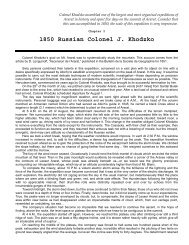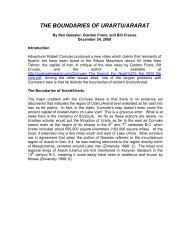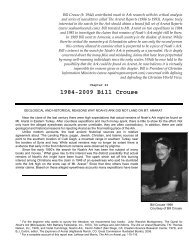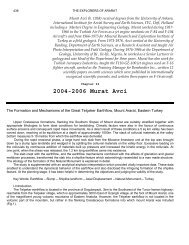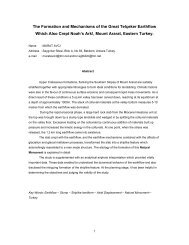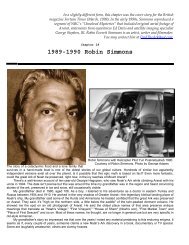1876 British Viscount & Ambassador James Bryce - Noah's Ark Search
1876 British Viscount & Ambassador James Bryce - Noah's Ark Search
1876 British Viscount & Ambassador James Bryce - Noah's Ark Search
You also want an ePaper? Increase the reach of your titles
YUMPU automatically turns print PDFs into web optimized ePapers that Google loves.
166 THE EXPLORERS OF ARARAT<br />
that with which Swiss guides start. However, we were soon cruelly undeceived. In twenty-five minutes there came a<br />
steep bit, and at the top of it they flung themselves down on the grass to rest. So did we all. Less than half a mile<br />
farther, down they dropped again, and this time we were obliged to give the signal for resuming the march. In another<br />
quarter of an hour they were down once more, and so it continued for the rest of the way. Every ten minutes’ walking—<br />
it was seldom steep enough to be called actual climbing—was followed by seven or eight minutes of sitting still,<br />
smoking and chattering. How they did chatter! It was to no purpose that we continued to move on when they sat down,<br />
or that we rose to go before they had sufficiently rested. They looked at one another, so far as I could make out by the<br />
faint light, and occasionally they laughed; but they would not and did not stir till such time as pleased themselves. We<br />
were helpless. Impossible to go on alone; impossible also to explain to them why every moment was precious, for the<br />
acquaintance who had acted as interpreter had been obliged to stay behind at Sardarbulakh, and we were absolutely<br />
without means of communication with our companions. One could not even be angry, had there been any use in that,<br />
for they were perfectly good-humored. It was all very well to beckon them, or pull them by the elbow, or clap them on<br />
the back; they thought this was only our fun, and sat still and chattered all the same. When it grew light enough to see<br />
the hands of a watch, and mark how the hours advanced while the party did not, we began for a second time to<br />
despair of success.<br />
I fancy we passed, in a grassy hollow at about 9000 feet above the sea, the spot, which they call the Hermitage,<br />
which seems to be the site of General Chodzko’s meteorological camp of July and August 1850. He told me there was<br />
a spring there, but either it is dry at this season or else we missed it. There was pasture in many places, but we saw no<br />
cattle. What we were able to remark and enjoy was the changing aspect of the sky. About 3 AM, there suddenly<br />
sprang up, from behind the Median mountains, the morning star, shedding a light such as no star ever gave in these<br />
northern climates of ours, a light that almost outshone the moon.<br />
As we scrambled along a ridge above a long narrow winding glen filled with loose blocks, one of the Kurds<br />
suddenly swooped down, like a vulture, from the height on a spot at the bottom, and began peering and grubbing<br />
among the stones. In a minute or two he cried out, and the rest followed: he had found a spring, and by scraping in the<br />
gravel had made a tiny basin out of which we could manage to drink a little. Here was a fresh cause of delay;<br />
everybody was thirsty, and everybody must drink. When at last we got them up and away again, they began to dawdle<br />
and straggle; after a while two or three sat down, and plainly gave us to see they would go no farther. By the time we<br />
had reached a little snow-bed whence the now strong sun was drawing a stream of water, and halted on the rocks<br />
beside it for breakfast, there were only two Cossacks and the four Kurds left with us, the rest having scattered<br />
themselves about somewhere lower down.<br />
Accordingly I resolved to take what I wanted in the way of food, and start at my own pace. We were now at a<br />
height of about 12,000 feet. Everything lay below us, except Little Ararat opposite. The Kurds never come higher on<br />
the mountain than their flocks can find pasture, and on this side at least the pasture does not reach so high as where<br />
we were. Moreover, they have a superstitious reverence for he mountain, scarcely less than that of the Armenians:<br />
only, while the Armenian faithful believe it to be guarded by angels, the Kurds hold it to be the favorite haunt of devils<br />
and Jinn, who are ready to take vengeance on the disturber of their revels. The shepherds, therefore, avoid the heights<br />
as much as possible. It was an odd position to be in: guides of two different races, unable to communicate either with<br />
us or with one another, guides who could not lead and would not follow, guides one-half of whom were supposed to be<br />
there to save us from being robbed and murdered by the other half, but all of whom, I am bound to say, looked for the<br />
moment equally simple and friendly, the swarthy Iranian as well as the blue-eyed Slav.<br />
At eight o-clock I buckled on my canvas gaiters, thrust some crusts of bread, a lemon, a small flask of cold tea,<br />
four hard-boiled eggs, and a few meat lozenges into my pocket, bade good-bye to my friend, and set off. Rather to our<br />
surprise, the two Cossacks and one of the Kurds came with me, whether persuaded by a pantomime of encouraging<br />
signs, or simply curious to see what would happen. The ice-axe had hugely amused the Cossacks all through. This<br />
slope, a sort of talus or “screes,” as they say in the Lake country, was excessively fatiguing from the want of firm<br />
foothold, and when I reached the other side, I was already so tired and breathless, having been on foot since midnight,<br />
that it seemed almost useless to persevere farther. However, on the other side, I got upon solid rock, where the<br />
walking was better, and was soon environed by a multitude of rills bubbling down over the stones from the snowslopes<br />
above. The summit of Little Ararat, which had for the last two hours provokingly kept at the same apparent<br />
height above me, began to sink, and before ten o’clock I could look down upon its small flat top, studded with lumps of<br />
rock, but bearing no trace of a crater. Mounting steadily along the same ridge, I saw at a height of over 13,000 feet,<br />
lying on the loose blocks, a piece of wood about four feet long and five inches thick, evidently cut by some tool, and so<br />
far above the limit of trees that it could by no possibility be a natural fragment of one. Darting on it with a glee that<br />
astonished the Cossack and the Kurd, I held it up to them, made them look at it, and repeated several times the word<br />
“Noah.” The Cossack grinned, but he was such a cheery, genial fellow that I think he would have grinned whatever I<br />
had said, and I cannot be sure that he took my meaning, and recognized the wood as a fragment of the true <strong>Ark</strong>.<br />
Whether it was really gopher wood, of which material the <strong>Ark</strong> was built, I will not undertake to say, but am willing to<br />
submit to the inspection of the curious the bit which I cut off with my ice-axe and brought away. Anyhow, it will be hard<br />
to prove that it is not gopher wood. And if there be any remains of the <strong>Ark</strong> on Ararat at all—a point as to which the<br />
natives are perfectly clear—here rather than the top is the place where one might expect to find them, since in the<br />
course of ages they would get carried down by the onward movement of the snow-beds along the declivities. This



